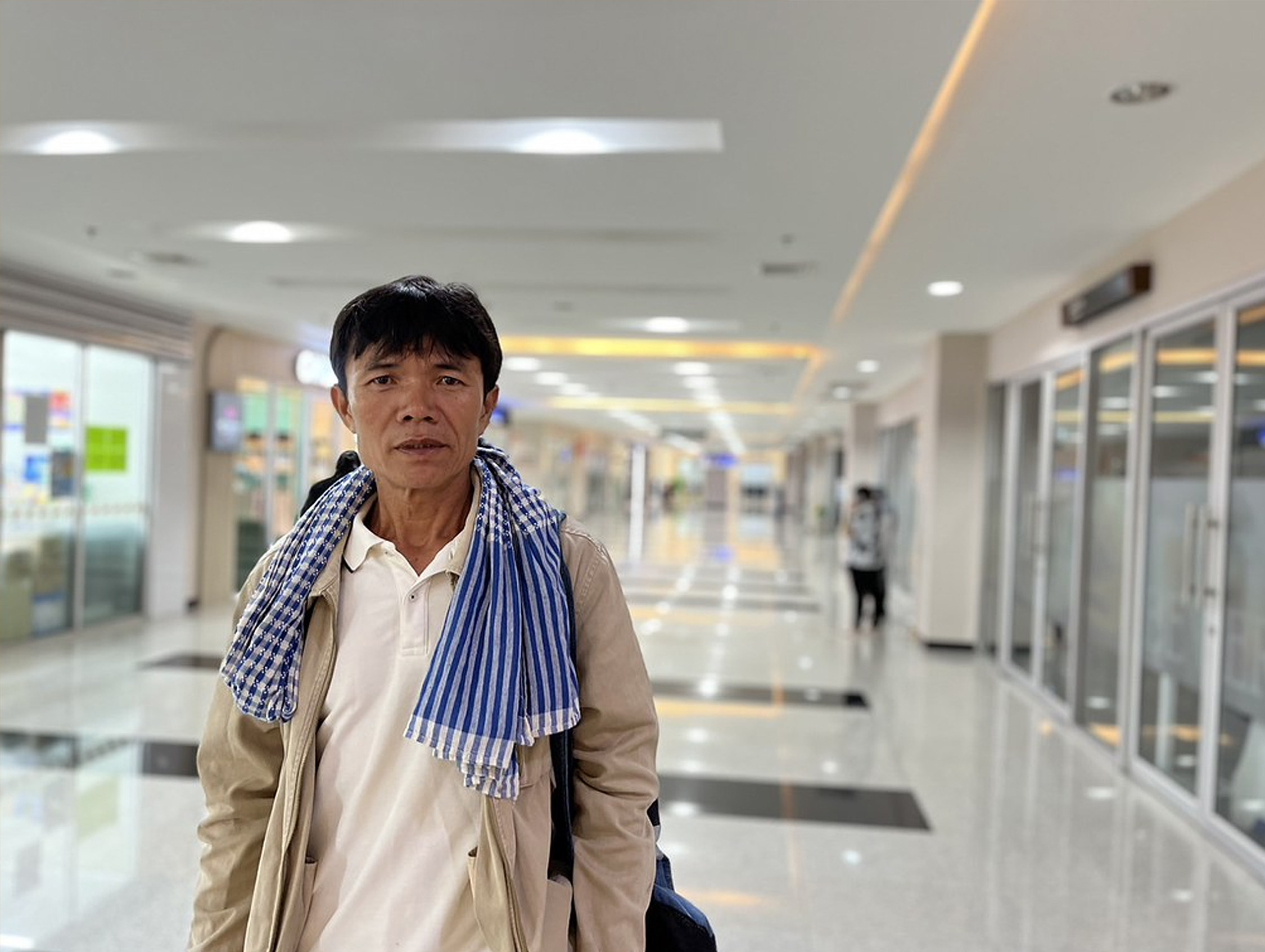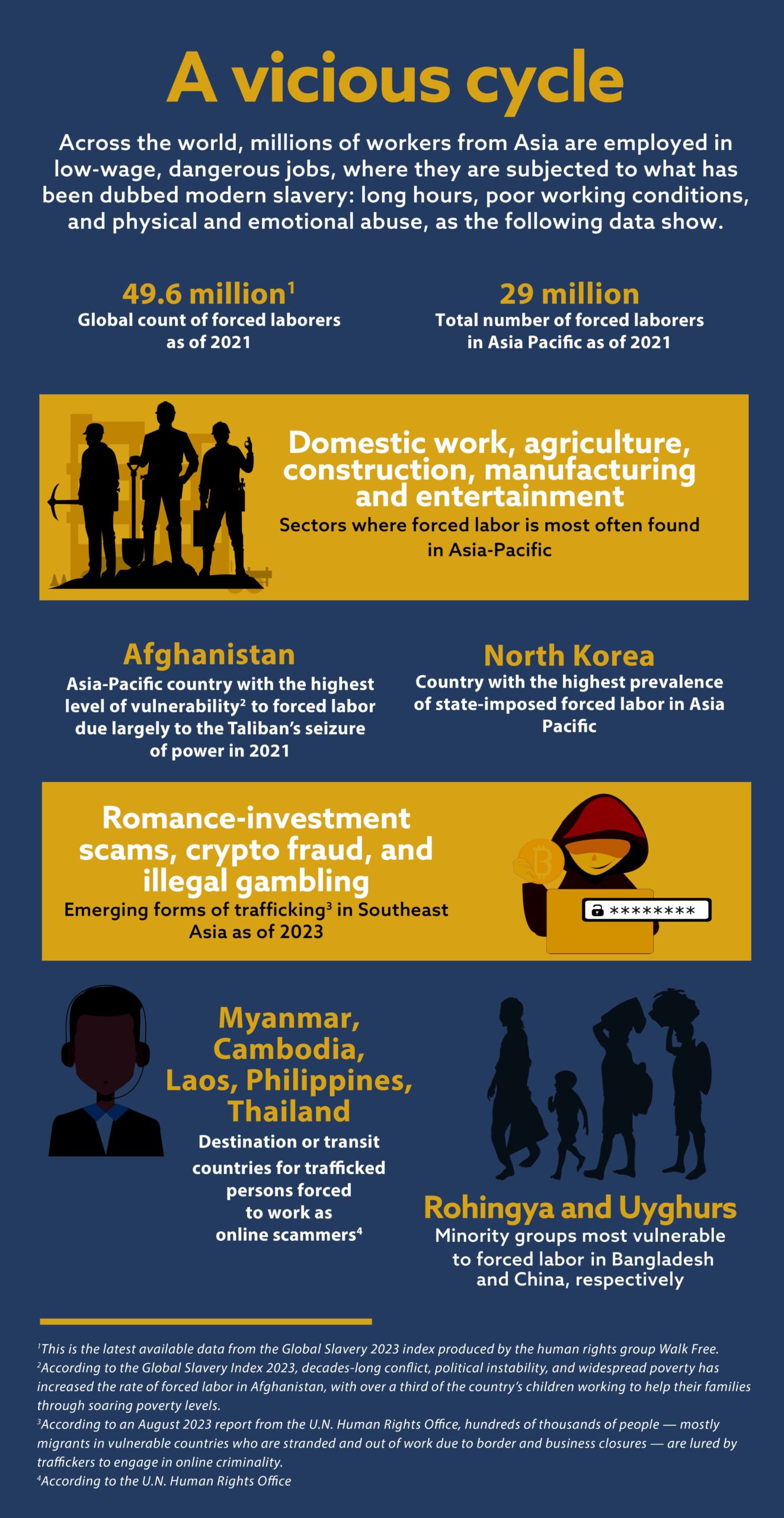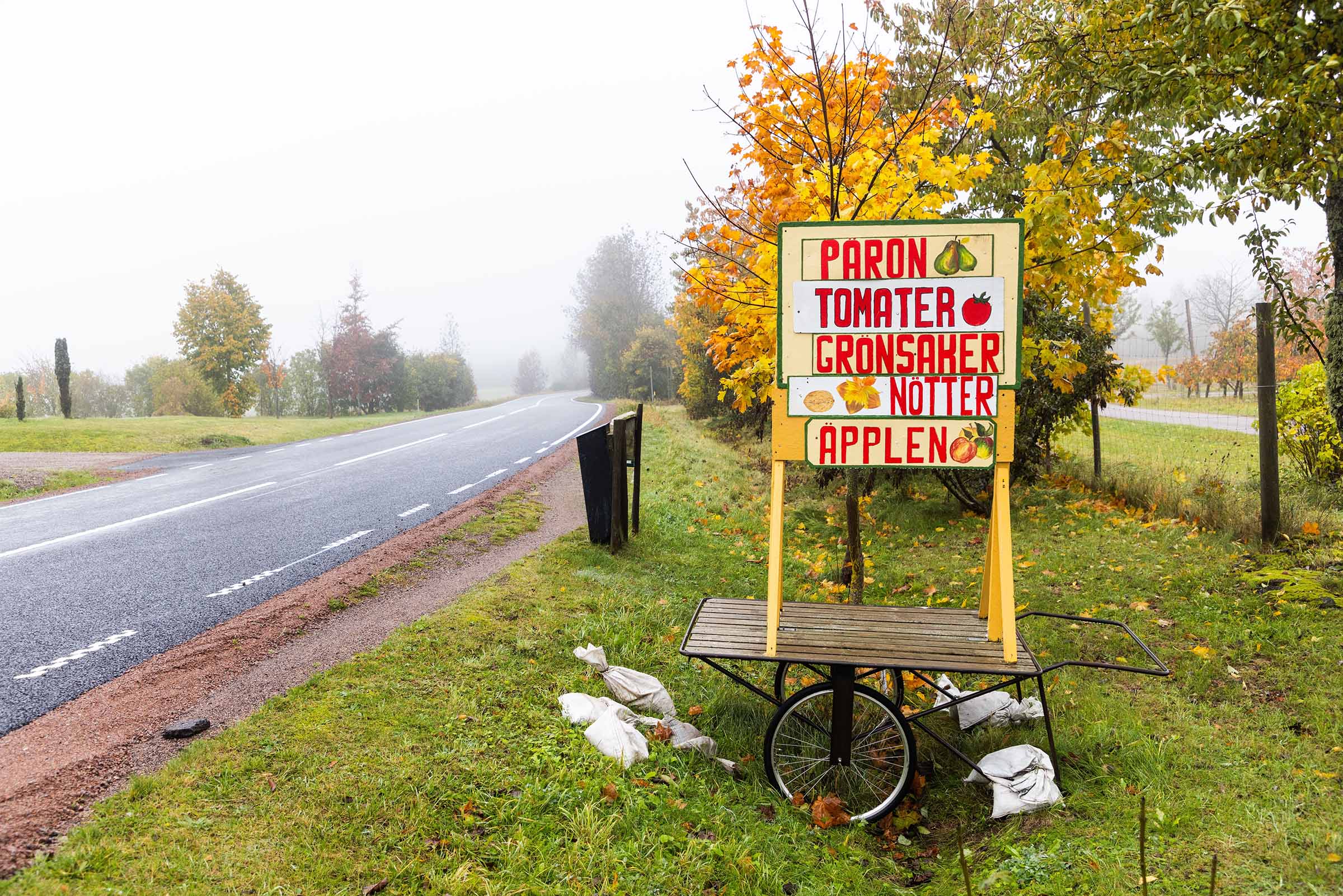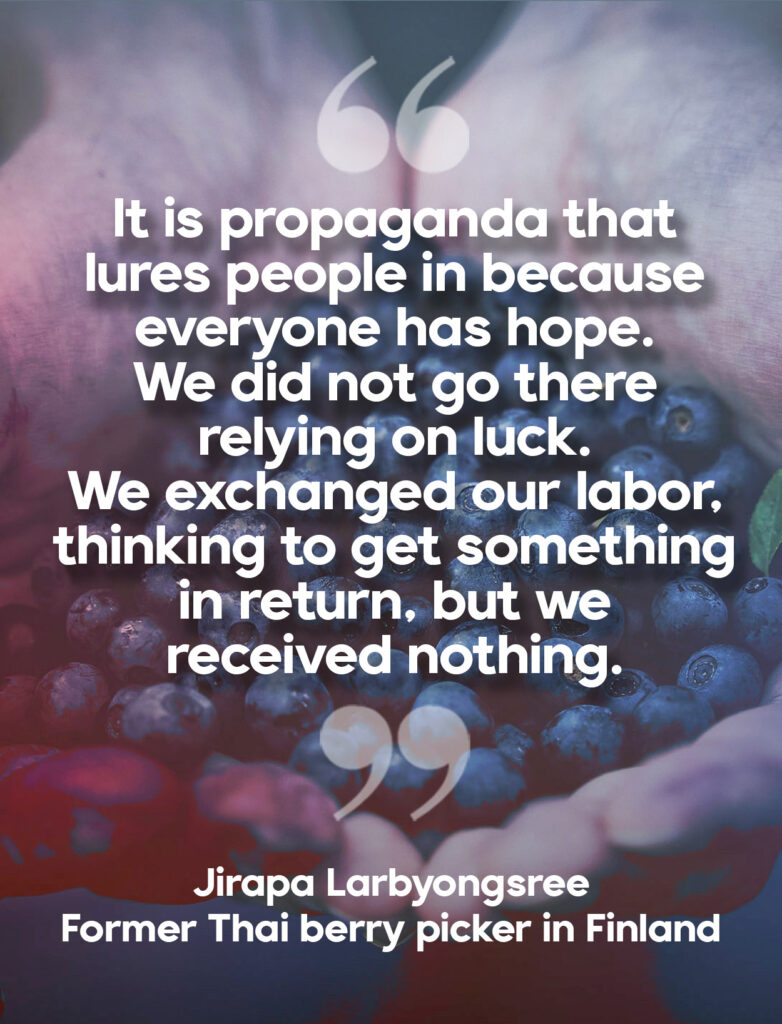|
Getting your Trinity Audio player ready...
|
For 18 years since 2006, Finland and Sweden have turned to Thai labor-trafficking agencies to recruit Thai workers to pick berries for them. Thousands of Thai farmers, primarily from the northeastern provinces, left their homes to be berry-pickers in the Nordic countries in hopes of improving their lives when they return home.
Around 100,000 Thai farmers during these 18 years were brought to Finland and Sweden by 13 berry companies.

While some achieved their goals, earning more than 100,000 baht (US$2,750) for seasonal work, many others came home empty-handed or in debt. Some have experienced bankruptcy.
Junya Yimprasert, founder of Action for People’s Democracy, or ACT4DEM, has helped Thai berry pickers in Finland, who have lodged a total of 2,240 complaints since 2009. Of these, 400 cases are still pending and only 26 cases ended in victory in 2018.
“There is no job where you work two months and return home, still having to pay off debts,” said Junya.
She pointed out that the main reason that allows this system to deceive workers is the quota announced by the Ministry of Labour on the number of jobs available each year, which leads most people to think that the jobs are legal.
Thai berry pickers invest heavily in traveling across continents to work, only to return home with meager earnings. Some earned only a few hundred euros or around 175 baht (US$5) per day. Meanwhile, the current minimum daily wage in Thailand is 328 baht (US$9).
During these 18 years, around 120,000 visas were issued to the Thai berry pickers. Each of them paid between 50,000 and 100,000 baht (US$1,300-US$2,700) in Thailand to get a job in this industry.
One of them was 40-year-old Jirapa Labyongsree, who decided to be a berry picker in Finland in 2022 to earn money for her farm.
She said she was persuaded by her village friends and promised by the berry company’s agency that she would earn approximately 100,000 baht (US$2,750). With this income, Jirapa thought she would not have to take on additional jobs to make ends meet when she returned home.
Unfortunately, Jirapa did not earn this much money, and had to work hard to pay off her debt to the berry company.
“It is propaganda that lures people in because everyone has hope. We did not go there relying on luck. We exchanged our labor, hoping to get something in return, but we received nothing,” said Jirapa.
Praisanti Jum-angwa, a farmer from Chaiyaphum province in northeastern Thailand, has been awaiting justice since 2013. He was brought to Finland by the berry company Ber-Ex Oy.
Like many other Thai farmers, he also believed that berry picking in a developed country would enable him to improve his family’s financial situation. He, too, was convinced by villagers who had gone to Finland and returned to Thailand with a large amount of money.

He revealed that some Thai farmers were told that they did not have to invest much because the companies would provide everything, but in reality they were lured into working for free.
“It is true that the companies pay everything, but you have to work for free. Is there any country where you go to work but do not earn money? You work, so you must earn money,” remarked Praisanti.
Phon (not her real name) said she went to Sweden from July to October 2022. Like those in Finland, Thai berry-pickers in Sweden were burdened with debt and had to work to repay the company.
A high price to pay
“The cost of accommodation and travel, and even the cost of the bus to pick up workers to go to the farms have to be paid for. The money that the company advances has to be repaid with interest. The company exploits the workers a lot,” said Jirapa.
When he decided to go to Finland in 2013, Praisanti was required to pay a deposit of 20,000 baht (US$550) in December 2012 and an additional 50,000 baht (US$1,380) in April 2013.
Despite not being a client, the Bank of Agriculture and Agricultural Cooperatives approved a 50,000 baht loan for him. This, after the company issued a letter guaranteeing an income of 204,000 baht (US$5,600) for 60 days of working in Finland.
“When we obtained a visa, the company said it would give us 1.80 euros (US$1.93) per kilogram (of berries harvested). But when we got there, it gave us only 1.40 euros (US$1.50) per kilogram,” said Praisanti.
The berry pickers must also pay for housing and transportation provided by the company. They also needed to cover the cost of fuel. These on top of shouldering the costs of their flight tickets, accommodation, and transportation paid in advance by the hiring companies, leaving them with huge debts.
Some berry pickers were required to sign a loan contract, without being informed of the interest rate and the total amount of money they needed to repay. This led them to unknowingly work for free. Many were intimidated by the company and told they would be sued if they failed to repay their debt.
Cruel conditions
The berry pickers were forced to work under unbearable conditions for 12 to 20 hours per day with no day off. They lived in crowded conditions, with some sleeping in the kitchen. Work started at 3:00 a.m., and after returning to the camp by 8:00 p.m., they still had to weigh the berries until around midnight.
Jirapa explained that the workers’ income was based on the weight of the berries they harvested. Prices varied, depending on how difficult or easy it was to harvest the berries. The company did not provide clear information to the berry pickers regarding how much they collected or how much they actually earned.
Jirapa stated that there was no guaranteed minimum income, leaving them unable to claim fair compensation. Unfortunately, most of the workers did not learn about this reality until they experienced it themselves.
Praisanti was assured he could relocate to another camp if there were no berries to pick, but when he and other farmers asked to be transferred, their request was denied. Worse, the company gave them an ultimatum – return to Thailand or stay.
Unlike cultivated berries, wild berries were located in the forests, making the job quite challenging. The berry pickers had to walk long distances carrying tens of kilograms of berries.
Those who fell ill faced difficulties as the camp management refused to take them to see a doctor. They must buy medicine on their own or use medicine brought from Thailand.
“If we do not go to work for one day, we lose a day’s income. We still have to pay though for accommodation and transportation,” said Praisanti.
To cover these specific costs, Praisanti said they must pick at least 50 kilograms of berries. To earn a profit, the berry pickers should harvest around 70 kilograms.
Praisanti further revealed that there was an attempt to confiscate the workers’ passports at his camp, but it was unsuccessful. It was later discovered that in other camps, the management’s staff had successfully taken away the passports of his Thai friends.
After working for only one month, the company insisted on sending the workers back to Thailand, using intimidation tactics to force them out.
“We demanded that if they sent us back home, they should pay us for the berries we picked in one month’s work, but they refused to pay. They said that we owed them.”
For those in Sweden, Phon stated that the company did not provide proper care to the berry pickers from the beginning of their journey. While traveling around the country to harvest berries, the company provided them with a vehicle without the required vehicle taxes.

In Sweden, berry pickers have been provided with employment contracts promising a minimum wage since 2009. However, the situation in this country was no different because the contract was nothing more than empty promises.
Phon recounted that she earned only 300 Swedish krona or around 1,000 Thai baht (US$27). And when she and other berry pickers returned to Thailand, they received letters from the company’s lawyers demanding that they repay the debt within seven days.
A long-awaited call for change
Praisanti is one of the Thai berry pickers who filed a complaint after returning to Thailand in 2014. He stated that after the workers were provided assistance by the Thai authorities in Finland, the company promised to pay wages, but only around 30 out of 50 people got paid, leaving the rest unpaid until today.
Praisanti spent around 100,000 baht to be a berry picker, yet the company paid him only 50,000 baht in return. He remains burdened with debt to the company. He revealed that at the time, news about the Thai berry pickers drew attention in Finland, particularly from the Finnish unions which engaged in discussions with the berry company and urged their government to take action. Unfortunately, the issue received far less attention in his homeland. No spotlight was shed on Thai berry pickers.
He had never imagined that being a berry picker would lead to such hardships. In fact, one of the biggest reasons Thai farmers decide to go to Finland is because of an agreement between Thailand’s Ministry of Labour and the berry companies, which promised but failed to provide legal protection to Thai workers.
Despite the high costs of damage incurred, the Ministry of Labour insists on sending farmers to these countries every year without properly addressing the issue, Praisanti said.
According to the Department of Employment data as of Sept. 26, 2023, Thais are still recruited to pick wild berries, with 1,155 now in Finland and 958 in Sweden.
In 2014 Praisanti and the other Thai berry pickers filed a complaint claiming human trafficking and calling on the Thai government to conduct an investigation. Their case faced difficulties as they were not recognized as company employees. The legal process was halted following the 2014 coup, and it was not until 2022 that Prasanti was notified of the statues of their case.
The Department of Special Investigation (DSI) issued an official letter, stating that its investigation found no corruption on the part of the berry company, and the company had abided by the framework of the law in taking Thai people abroad. As a result, the DSI ceased its investigation. The company still operates as usual and is still recruiting Thais to work as berry pickers.
Junya pointed out that Thailand has never seriously addressed the issue and if it had been properly addressed, there would not be such a large number of victims.
Hopes for a silver lining
Praisanti said the berry pickers need the relevant agencies to pay their compensation because most of them are in debt. Some have had their assets seized, and many face family issues after being unable to repay the debt. He argued that the recruitment of Thai people as berry pickers should be conducted under a government-to-government agreement, without private agencies or other intermediaries involved.

Junya, who has witnessed unfair treatment of Thai berry pickers for over 10 years, has called for an immediate halt to the current system until a fair agreement has been negotiated. “If the (berry) companies have real needs, they must pay. There must be a strong legal framework governing labor to pay workers according to the hours they have worked,” she said.
Junya reiterated the importance of ensuring that assistance reaches not only those who file complaints but also those who have suffered silently for a decade.
The taxes and benefits Finland and Sweden have gained from exploiting Thai berry pickers should be used to compensate them. The DSI and the Ministry of Justice must establish a committee to oversee the investigation. She remarked that a strong government is needed to make these processes successful.
“I hope that Thai authorities will seriously solve this issue, rather than letting it persist from 2005 until the present,” one of the berry pickers remarked. ◉
This article was originally published by Prachatai. Republished with permission.




















